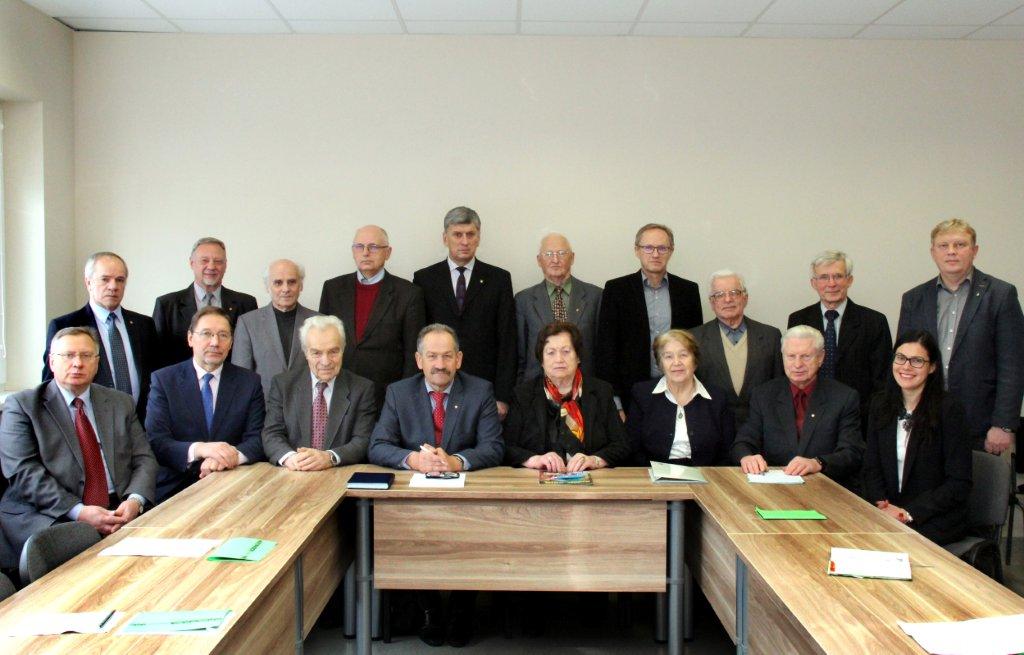Composition
- ENG
- Composition
- Division of Agricultural and Forestry Sciences
Division of Agricultural and Forestry Sciences

The Division of Agricultural and Forestry Sciences was established in 1995, after the reorganisation of the Division of Biological, Medical, and Agricultural Sciences. Currently, the division is chaired by Vidmantas Stanys. At present, the division has 19 full members, eight members emeriti, and ten foreign members. The division works in five sections: agronomy (chair Giedrė Samuolienė), forestry (Darius Danusevičius), veterinary medicine and animal sciences (Henrikas Žilinskas), agriculture and environmental engineering (Egidijus Šarauskis), and food sciences (Pranas Viškelis). The Lithuanian Soil Science Society (chair Jonas Volungevičius) is affiliated to this division, which also supervises the work of the Water Council of the Lithuanian Academy of Sciences (chair Arvydas Povilaitis).
The activities of the division are concentrated on the solution of the most relevant scientific issues in agriculture and forestry, food, husbandry and veterinary, environmental engineering, plant and animal biology and parallel fields and directions, on the promotion of research results, the development of and innovation in experimental agriculture. Considerable attention is paid to inter-institutional, interdisciplinary, and international relations, and to the promotion of the prestige of the agrarian sciences. The division organises international and local scientific conferences, discussions, and seminars; it is actively promoting activities of young scientists. Members of this division have conducted numerous significant research studies: Stasys Karazija is the author of the forest typology theory, and Algirdas Sliesaravičius pioneered research into plant biotechnology in Lithuania. Veronika Vasiliauskienė is one of the authors of the school of grassland husbandry, Albinas Kusta is one of the initiators of the ‘Nemunas’ valley for research, studies, and business, and Zenonas Dabkevičius is a nurturer of the school of plant pathology. Vidmantas Stanys focuses on research into genetics, biotechnology, breeding, and creation of new varieties of horticultural plants, Vytautas Ruzgas concentrates on winter wheat, and Darius Danusevičius on forest plants. Alfas Pliūra investigates the genetic variety of forest plants. Česlovas Jukna and Vytautas Konstantinas Sirvydis have developed modern nutritional technologies for domestic birds and animals, respectively; Henrikas Žilinskas has been working on the improvement of animal reproductive qualities, Vidmantas Bižokas’s research is focused on veterinary surgery and lymphology. Antanas Sederavičius conducts and organises research into diagnostics of the digestive tract of livestock. Pavelas Duchovskis is a promoter of the school of plant ontogenesis, phytophysiology, and ecophysiology; Algirdas Juozas Motuzas examines the soils of Lithuania and has compiled their classification. Arvydas Povilaitis’s scientific research deals with water resources and their use, and Algirdas Raila focuses on thermoenergetic processes in biotechnologies. Pranas Viškelis has developed products and innovative technologies for processing biologically valuable plant-based food. Žydrė Kadžiulienė conducts research on and is an expert in meadows, agroecology, and environmental science, Gediminas Staugaitis is an expert in agrochemistry and soil science, and Egidijus Šarauskis is interested in engineering of tillage technologies. Giedrė Samuolienė focuses her research on physiology, photophysiology and ecophysiology of plant productivity and initiations of morphogenesis and flowering; Elena Bartkienė’s fields of research include primary production of agricultural food raw materials, development of food (bio)technologies, and factors influencing consumers' food choices. Kęstutis Armolaitis is an expert in forestry, ecology, and environmental science; Mindaugas Malakauskas conducts research in epidemiology of bacteria pathogenic to animals, prevention of their spread, and antibiotic resistance using molecular biology methods; Dainius Steponavičius is a researcher of the working processes of harvesting machines and of the constructional and technological parameters of harvesting machines and an expert in the systems of precision agricultural machines.
Members of the division take part in various local and international research programmes and projects and provide qualified expert examinations, collaborate with businesses in developing biologically valuable foods, designing new technologies and the prototypes of functional food, in implementing science and innovation projects, and in providing consultancy.
